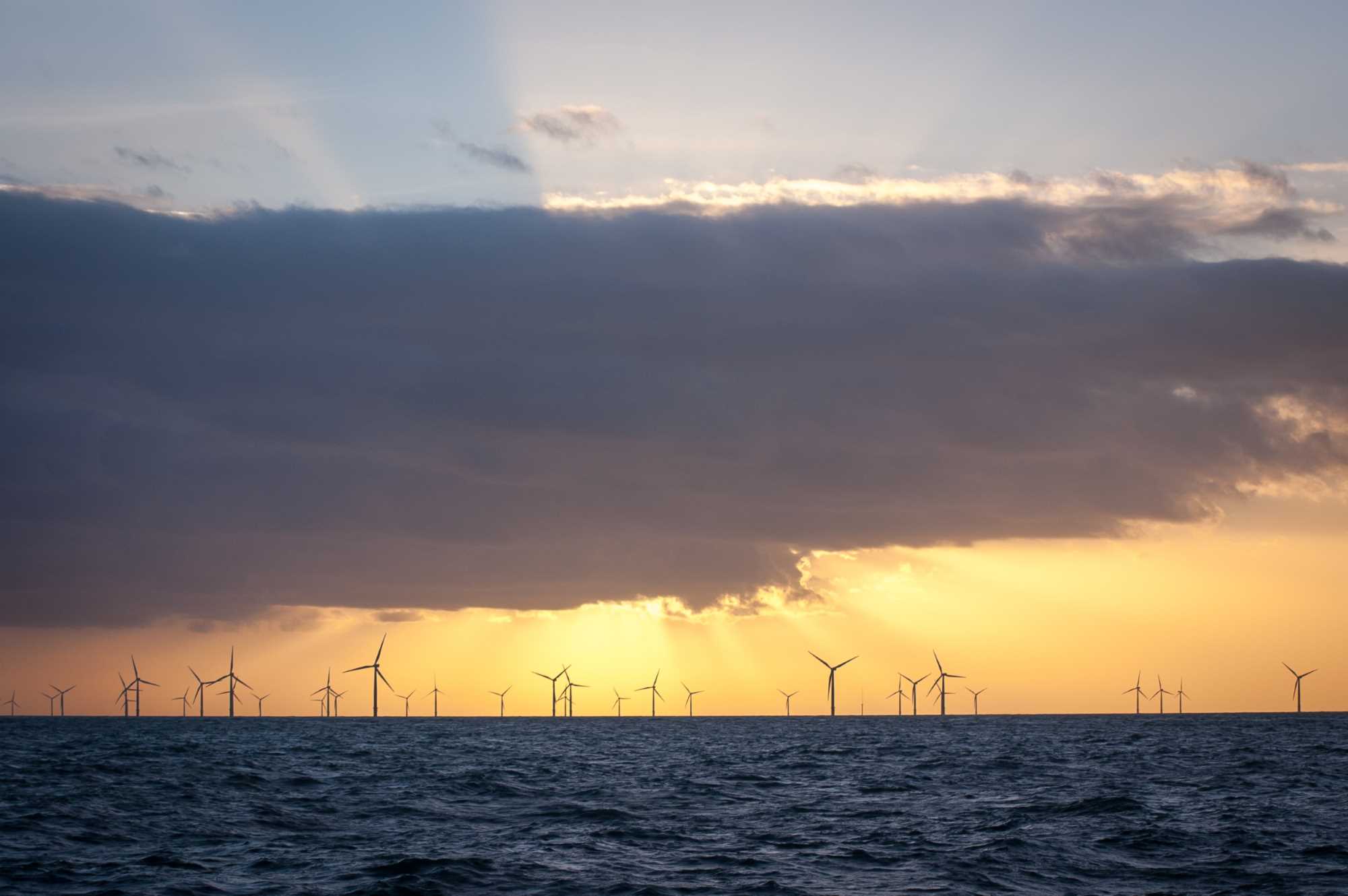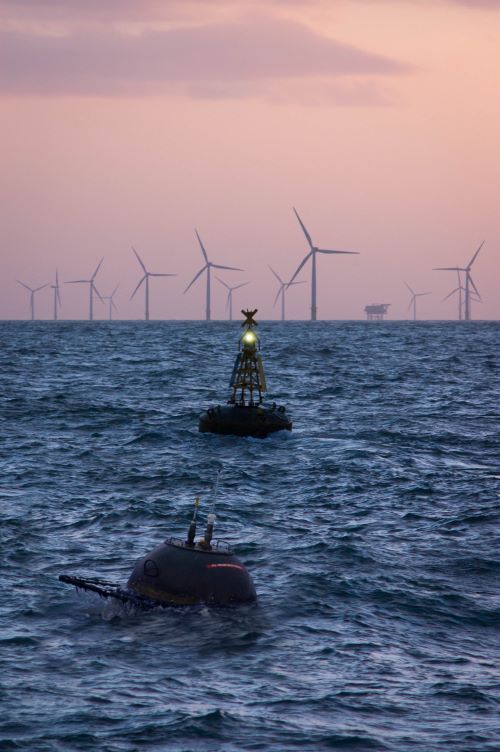Offshore and Marine Renewable Energy
Offshore and Marine Renewable Energy (OMRE) is rapidly growing in interest and commitment by the UK and many other countries worldwide as alternative, sustainable energy sources. These renewable technologies offer a way towards de-carbonising the UK’s energy supply.
The most mature of these technologies at present is offshore wind. The UK Government has pledged to meet zero carbon emission targets by 2050 and has made a commitment to deliver 40 GW of offshore wind by 2030. Similar objectives of de-carbonisation and increasing diversity and resilience of energy supply now apply across the world.
OMRE developments must be placed in the right locations to generate energy whilst balancing the impact they have on the marine and offshore environments on which they are located. Increasingly, it is recognised that insights and analysis from cross-cutting disciplines is needed to address the complex and multi-faceted topics relating to offshore wind (and other renewable energies), to enable growth and development, to assist the commitment to reduce carbon emissions and to help mitigate climate change. Balancing the environmental benefits and disbenefits of large-scale OMRE development requires holistic analyses of environmental, social, economic, engineering, policy and regulatory considerations.
Cefas has actively contributed to the sector from the very first proposals in the UK twenty years ago at North Hoyle offshore wind farm, and we have advised, led or worked collaboratively on offshore wind farm (OWF) projects for both government and industry.
In the last few decades, Northern European seas have seen several gigawatts (GW) of renewable energy deployed (predominantly in the North and Baltic seas). Across these developments Cefas and partners (e.g. local consultancies/agencies) have provided much of the advice. For several years, the USA has been looking to the UK, including Cefas, for expertise. Now the USA has ambitious plans for fixed OWF along the east coast State and Federal waters and floating OWF, as well as wave and tidal stream on the west coast.
Our internationally recognised science and scientists can assist both nationally and internationally as we have significant experience of providing OMRE policy and scientific advice to governments, the European Union and international bodies. We work innovatively in the context of a whole systems approach with a range of international academic and industry organisations on applied delivery projects and research.
Our multidisciplinary scientific expertise is relevant to future OMRE development, making use of our technical knowledge on marine legislation, the regulatory and consenting processes, and marine engineering, along with our extensive scientific experience and understanding of marine species and habitats. This expertise makes us well placed to brief ministers, policy makers, regulators and the public, and identify strategic knowledge and evidence gaps. In doing so, we act as an independent and trusted bridge between governments, academia, and industry.

Wind turbines at sunset

waverider in front of turbine
Cefas’ main activities relating to OMRE include:
- Regulatory advice, assessment, and guidance (national and international)
- Monitoring and design, surveying and data collection
- Intra and export cables
- Site characterisation – seabed, water column and surface
- Full life cycle – construction, Operation, Maintenance and decommissioning.
- Marine Spatial Planning
- Fisheries and Fishers
- Aquaculture and aquatic health
- Co-location
- Environmental effects and impact assessment
- Cumulative effects and impacts
- Risk assessment
- Interactions from receptors to systems
- Coastal processes and contaminants
- Benthic ecosystems (incl. Functional traits and indicators)
- Fish, invertebrates, marine mammals, and seabirds
- Energy emissions (underwater noise, Electromagnetic fields - EMF)
- Climate change, policy
- Socio-ecosystem assessment (such as Socio-Ecological-Systems approaches)
- Ecosystem services / Natural Capital
- Strategic thinking (places/placement/spatial extent)
- Data management and datasets (targeted)
- Use of big data and data science techniques (e.g. OneBenthic initiative), open-access publications and a suite of interactive web apps.
Microsoft.CSharp.RuntimeBinder.RuntimeBinderException: Cannot perform runtime binding on a null reference at CallSite.Target(Closure , CallSite , Object ) at ASP._Page_Views_Partials_grid_editors_Textstring_cshtml.Execute() in C:\home\site\wwwroot\Views\Partials\grid\editors\Textstring.cshtml:line 5 at System.Web.WebPages.WebPageBase.ExecutePageHierarchy() at System.Web.Mvc.WebViewPage.ExecutePageHierarchy() at System.Web.WebPages.WebPageBase.ExecutePageHierarchy(WebPageContext pageContext, TextWriter writer, WebPageRenderingBase startPage) at Umbraco.Web.Mvc.ProfilingView.Render(ViewContext viewContext, TextWriter writer) in D:\a\1\s\src\Umbraco.Web\Mvc\ProfilingView.cs:line 25 at System.Web.Mvc.Html.PartialExtensions.Partial(HtmlHelper htmlHelper, String partialViewName, Object model, ViewDataDictionary viewData) at ASP._Page_Views_Partials_grid_editors_Base_cshtml.Execute() in C:\home\site\wwwroot\Views\Partials\grid\editors\Base.cshtml:line 20
We have a long and successful track record of working nationally and internationally with the OMRE sector, as well as the oil and gas industry, in research, and in the provision of advice on fish and shellfish (biology, migrations and ecology). These include:
Government
- Defra: Compensation methods for future offshore wind development: A review of the use of compensatory measures and applicability to UK offshore developments.
Industry
- The Crown Estate (TCE): Cefas provide key expertise and advice to TCE to support their enabling actions programme, marine spatial planning, consents and fisheries management.
- Floating Offshore wind – moorings (Pelastar and Blue-H) funded by ETI/Carbon Trust.
Research
- International Council for the Exploration of the Seas (ICES) working groups e.g. MBRED - Marine Benthal and Renewable Energy Developments, MRE- Marine Renewable Energy, OWDF - Offshore Wind Development and Fisheries, SFD - Spatial Fisheries Data.
For more information, view our interactive Sway presentation or contact us.
To view the Sway in full screen or an accessible version, you may wish to press the expand button in the top right, or open in a new tab by clicking the three dots or here.


